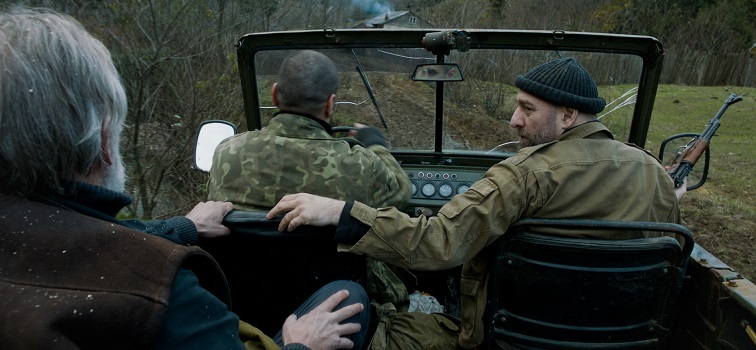“Death is their mother”
Directed/Written by: Zaza Urushadze
Cast: Lembit Ulfsak, Elmo Nüganen, Giorgi Nakashidze, Misha Meskhi
Swift shot: An obscure, foreign film about a nation most Americans couldn’t point out on a map if I literally put a gun to their head. Set in Abkhazia during the 1992 post-Soviet power struggles in that region, Tangerines is a film about loss, humility, and honorable pride. While it is set in a far off land, with picturesque mountains and has an almost ethereal quality to it, Tangerines is really a parable for the tragedy that is war.
This parable, this fiction, is about Ivo (Ulfsak) a wise old Estonian man on a mountain in Abkhazia, who has stayed behind to pick a final crop of tangerines with his brave friend, Margus (Nüganen). Most of the Estonians have fled the area, because this isn’t their fight. They’ve abandoned their homes to fate and misery. The Georgians are battling against the Abkhazians, aided by Islamic mercenaries, to prove they are the rightful stewards of the land. But, in the end, the land will swallow them all up . . . to become fertilizer for a new crop of fresh tangerines.
Ivo is approached by a small patrol of Chechen mercenaries led by Ahmed (Nakashidze), who commends Ivo on his bravery for staying behind, but also thinks him foolish. After he takes some foodstuffs, Ahmed departs Ivo’s home. As the patrol is leaving, they are ambushed by a group of Georgians and the two squads essentially kill one another. Save Ahmed, the Islamic mercenary, and Niko (Meskhi), a young Georgian who fired on Ahmed’s patrol, killing the hired-gun’s best friend.
Margus and Ivo decide to get rid of the evidence of the fire fight, and they take both men into Ivo’s home to help them heal. Mind you, these wounded pups are mortal enemies! Ahmed is not as badly wounded as Niko, and he keeps telling wise-old Ivo that he is wasting his time trying to heal the Georgian, because he is going to kill Niko the first chance he gets in order to avenge his friend.
Harboring any soldiers during wartime is a very tricky, and dangerous, gambit. Ivo and Margus have decided to do what they feel is humane. But Ivo has an agenda, driven by personal tragedy, that he hopes he can perhaps remind these warriors they are themselves fools, for fighting one another.
As time passes, it becomes clear that Ivo and Margus aren’t going to get the help of a local group of soldiers to help pick their tangerines. Margus is obsessed with the harvest. He stayed behind with his friend to start a business, but really, he’s catching on that . . . “It’s idiotic to start a tangerine business in wartime.” So, after he sells his fruit, he’s going back to Estonia, and hopes he can convince Ivo to do the same.
The two wounded warriors, Ahmed and Niko start to heal, and Ivo persuades them both to at least not kill one another under his roof. Bound by honor, they reluctantly agree. But, how long can Ivo keep them from tearing each other apart? And, more importantly, why should he bother? If he patches them up and they don’t kill each other in his living room (bit of irony there) they’ll just end up killing each other on the front in some wooded battlefield in the mountains.
Tangerines is torpid in its execution, and it won’t hold many of our American youth’s interest for long, I fear. Of course it is a subtitled film, and it isn’t easy to relate to the geopolitical machinations for many in the privileged West. But, the story offers a great take away for those that can sit through the lack of action. While there isn’t much motion, there is certainly plenty of emotion and tension, as each second you wonder, is this when they’ll finally snap and kill each other? Has Ivo wasted his days on these soldiers?
War is a terrible burden on the noble minded. Obligation courses in the veins of young men, and often spills for a piece of land that will stand regardless of which nation claims ownership.
A mountain doesn’t deign to wonder who rules it.
Tangerines features some wonderful cinematography, and the story has a satisfying conclusion . . . a likely conclusion at that. Nothing is forced in the script, but a lot of time is spent watching people reflect on their current situation, and at times the film feels like an old painting on the wall. It kind of just sits there, waiting. But, maybe that is the point, to slow down and think . . . rather than acting without regard for humanity. If you are looking for an education on bravery and honor, Tangerines delivers it by the crate.




